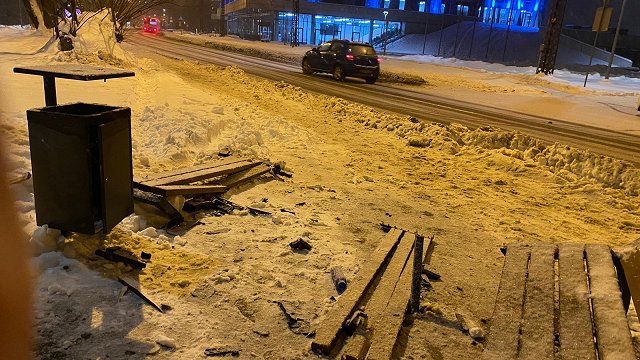In the last week of May, on a weekday morning, a passenger on a train at Šķirotava station became ill and died on the train. The train was stopped. Passengers could go to other public transport within Rīga, but those on the line outside Rīga had a different story.
At around 9 o'clock, a train from Ogre stopped at Salaspils station and did not go any further. Ginta, a passenger on the train who was on her way to Riga at the time, told Latvian Television's "4. studija" program that only ten minutes later, when people started to enquire for themselves, the conductor announced that the train in front of them had technical problems. As it was a weekday morning and time was limited, passengers immediately turned to the mobile app, where they found very general, vague information.
"At the request of several passengers, the conductor went to check," said Ginta. "They come back - no, they have no information, they don't know how long they will be standing, maybe an hour, maybe half an hour. We go to the ticket office. There is a ticket seller sitting in the ticket office. We ask, do they have any information? No, they don't."
Knowing that in unforeseen situations, when the train cannot reach its destination on time, Vivi compensates customers for the extra costs incurred, stranded passengers in Salaspils have turned to the option of hailing taxis. However, the earliest they could get this service was promised in 1 hour and 20 minutes. At that time, no cars were available for hire.
Meanwhile, the next train and even the one after that remained standing right there in Salaspils. Since the first train that did not run anymore was the old train, the passengers all piled into the new, air-conditioned "Vivi" train, but there was still no concrete information on when and which train would run first.
The stop where the bus to Riga departs is very close to Salaspils station. People could not understand which would leave first - the bus or the train. In the end, about an hour after the first train had stopped, the level crossing closed, and the passengers, who had boarded the bus in uncertainty and hope, watched their train leave. The bus was parked for half an hour in the streets of Salaspils before leaving for Riga.
"Given the general situation in the country, that there are things of strategic importance and the need to be able to communicate in different crisis conditions, I think there is food for thought here," said Ginta.
Despite the situation experienced by passengers, Vivi did not want to admit that something was wrong with communication. Edgars Butāns, Head of Communications and Marketing at JSC Pasažieru vilciens, said:
"In our opinion, the optimal solution is often to wait for the next train on the line and then continue. We have agreements with bus operators, and in some situations, we have used bus operators, but we have to take into account the fact that we have more than 130 stops in Latvia. If we wanted to put a spare bus at every bus stop, always on standby, it would be a disproportionate expense."
In emergency situations, all information is available in a single system accessible to both Vivi and Latvian Railways employees.
"Both Latvian Railways and we are working on these issues to improve this notification, through mutual communication," Butāns stressed.
A new cooperation agreement between the Road Transport Directorate (ATD) and Pasažieru vilciens is currently being prepared and will be signed by the end of the year.
The current agreement does not contain specific clauses on passenger notification in non-standard situations. Overall, the new clauses in the contract should improve communication in emergency situations.
Sanita Heinsberga, ATD Public Relations Officer, explained that passengers are informed about crisis situations by the carrier.
"We already encourage Pasažieru vilciens (Vivi) and any public transport service provider in special cases, which is, for example, a train delay of an hour or more, that the carrier provides replacement transport, and in the case of a train this could be a bus. But the situation is not that simple, there are enough stations in Latvia and in different situations the bus is often slower. So this is not a one-size-fits-all solution either," said Heinsberga.
The new contract provides for passenger information to be provided by Vivi.
"Throughout the Rīga vicinity, [..] there would be two ways of notification: audial and visual. A screen with information and audial [loudspeakers]. There are currently only a few stations with loudspeakers [..] being used," Heinsberga said.


























